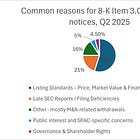B. Riley’s Auditor Transition Under Constraints
B. Riley hires BDO as its new auditor, discloses independence-related conflicts with other qualifying firms
On September 9, 2025, B. Riley Financial, Inc. (Ticker: RILY) announced via press release that its audit committee had appointed BDO USA as independent auditor for the 2025 audit, noting BDO’s engagement was subject to client-acceptance procedures. The Company’s current auditor, Marcum LLP, would resign upon completion of the 2024 audit, which, according to the Company, was still ongoing.
I discussed B. Riley’s delinquent annual report for the year 2024, the related Nasdaq delisting notice, and an unusually long SEC Corp Fin review in my previous post.
“On June 6, 2025, the Company announced that Nasdaq reviewed the materials submitted and granted an exception allowing the Company until September 29, 2025, to regain compliance.
Importantly, to regain compliance, B. Riley needs to file its delinquent annual and quarterly reports. B. Riley has provided limited details about why the annual and quarterly reports are late. For instance, the Form NT-10K filed on March 18, 2025, noted discontinued operations and accounting for goodwill and taxes as possible reasons…
…The answer to the delayed financial reports might be SEC scrutiny. On August 15, 2025, the SEC publicly released a comment letter review of B. Riley’s annual report for the year ended December 31, 2023 (see Edgar here, here, here, here, and here). It is possible that B. Riley was seeking to address SEC comments, some of which require an enhanced disclosure in future filings, before filing the annual report.”
The key point in B. Riley’s press release is that Marcum will remain as auditor until the 2024 audit is completed. Marcum’s resignation without completing the audit would have placed the Company in a tough spot, putting a question mark on B. Riley’s ability to file the delinquent financials by the September 29, 2025, deadline imposed by Nasdaq.
Regulation S-K Item 304(a)(1)(v) requires companies changing auditors to disclose reportable events that occurred during the most recent two years, such as material weaknesses in internal controls, inability to rely on management representations, and expansions of the scope of the audit.
On September 12, 2025, B. Riley filed an 8-K Item 4.01, providing a long list of reportable events related to ineffective internal control (including IT general controls at several subsidiaries, SOC 1 reliance issues, valuation, related-party disclosure, tax provision, goodwill, and journal-entry review). The material weaknesses were previously disclosed in the Company’s annual report for fiscal 2023.
While the disclosure of material weaknesses might not be new, the 8-K filing provided an interesting angle on the challenges facing B. Riley in engaging a new auditor. B. Riley is a complex business with multiple subsidiaries, which requires a reasonably large audit firm able to handle such complexity. From a practical perspective, it limits the selection to a handful of the largest audit firms.
B. Riley needs only one auditor, and, hypothetically, a pool of 4-5 audit firms should be sufficient to create a competitive bidding process – so what’s the challenge? According to B. Riley’s disclosure, the qualified audit firms provided non-audit services that could impair the auditor’s independence, possibly disqualifying some of these firms from serving as independent auditors of B. Riley (emphasis added):
“In considering the appointment of a new auditor, the Company identified firms that it believed were qualified to serve as auditor for a company with the size and complexity of the Company. In each case the Company identified issues that might impact the independence of the qualified firm. The Committee considered these issues carefully in choosing a new auditor. The Company is providing this disclosure to explain the facts and circumstances, as well as BDO’s and the Committee’s conclusions, concerning BDO’s objectivity and impartiality.”
According to the Company’s disclosure, the newly appointed auditor, BDO, also provided certain non-audit services to the Company, including “payroll, corporate secretarial, treasury/accounts payable and third-party licensed software services”.
However, after evaluating the scope of the non-audit services, fees received, and separation between the team performing the non-audit services and the audit team, the B. Riley’s audit committee and BDO concluded these services would not impair BDO’s objectivity or impartiality.
Additionally, according to the Company’s disclosure, all conflicting services that could have impaired the independence were ceased in April 2025:
“All services performed by BDO member firms that would be considered an impairment of BDO’s independence were terminated in April 2025.”
Publicly available disclosure has its limitations. For instance, the disclosure does not clarify for how long BDO provided the services or whether the non-audit engagement was terminated in April due to B. Riley's anticipated need for a new audit firm for fiscal 2025, indicating that the audit search was ongoing since mid-spring.
Notably, Marcum LLP, B. Riley’s auditor since 2006, was acquired by CBIZ CPAs PC in October 2024. According to the SEC comment letter dated April 30, 2025, the audit partner that signed B. Riley’s 2023 opinion, Richard Cooke, was still associated with B. Riley at least at the level of being copied on B. Riley’s responses to the SEC.
Audit firms routinely provide certain permissible non-audit services to their clients, and the cost of these services is reflected in non-audit and tax fees. For instance, services such as advice on accounting treatment of transactions or adoption of new accounting principles are permissible because they do not impair independence. However, B. Riley’s proxy statement does not list any non-audit or tax fees paid to Marcum, suggesting that all non-audit and tax work was done by the third-party consultants.
While the disclosure of non-audit services that may impair independence is uncommon, there are other examples.


